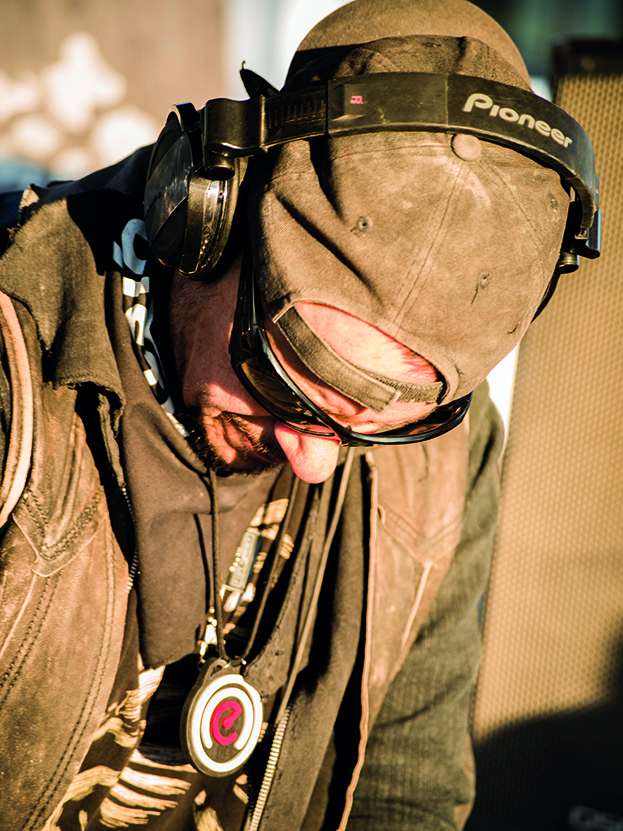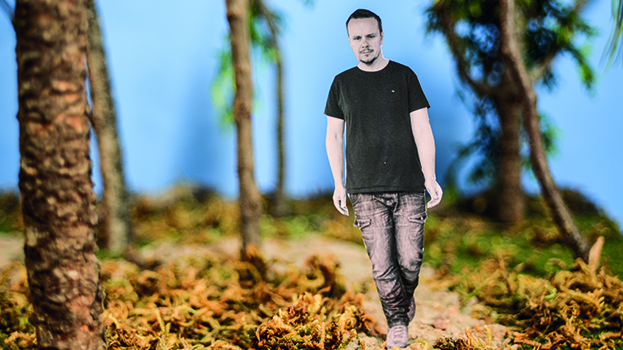SIMON SHACKLETON TALKS HIS SONIC TRANSFORMATION
DJ Mag meets the man formerly known as Elite Force to talk about his most personal electronic album to date...

There is one story told by Simon Shackleton which perfectly crystallises his status as the polar opposite of the stereotyped ‘Hollywood DJ’, all champagne-spraying, crowd-surfing, cake-throwing personality chasm. Last summer, while some of his more famous comrades might have been hanging out in the VIP room at Pacha in Ibiza, Shackleton was getting up at 4am every morning to cycle from his Kent farmhouse home to take photographs of the sunrise at Dungeness, a supremely bleak and desolate landscape on the county's south coast that's been described as Britain's only desert due to its spectacular lack of surface vegetation.
Struggling to find the energy to make music due to what he describes as "problems at home", the artist formerly known as breaks hero Elite Force (and who was once a purveyor of industrial big beat as one part of late ‘90s noiseniks Lunatic Calm) found solace in the quieter yet no less disciplined art of photography. In being in just the right place at the right time to capture the first rays of lilting, refracted light splitting the horizon.
After more than two decades of relentless touring, boat parties and club-nights, culminating in his highly-successful ‘One Series’ events (which see Shackleton spinning audiences through six hours-plus of laser-honed beats curated with a level of accuracy usually only seen in keyhole surgery), the musical well seemed to have run dry. ‘Shack’, as he is known to his friends, had reached his own personal event horizon, the point of no return at which the light can no longer reach you.

Something had to change. And for Shackleton, that started with the very way he approached making music. "A lot of the time you are really driven by the dancefloor as a DJ," he says over a glass of iced water in London's Big Chill House. "Everything is geared to that cycle of production/release/DJ shows off the back of it. Sometimes you feel a bit like a hamster in a wheel, going round and round doing the same thing.
"I was reading a few articles on how to break out of those cycles, and one thing I read was about using piano skills, which appealed to me because I'm a classically-trained pianist. So I started writing tracks just using a piano, and that made for a totally different flow.
"The more I got into it, the more I remembered just how much music is out there. It really broke down a lot of barriers. And as soon as I made that decision that I wasn't writing for the dancefloor any more, it freed up the creative process and the listening process, because I was checking out music I hadn't been into for years."
HAMSTER-WHEEL
The result of stepping off the dance music hamster-wheel is the splendid, deeply personal yet gloriously accessible new album ‘Piece Of Me’, Shackleton's first under his own name. From the Giorgio Moroder-esque, vocoder-fuelled analogue throb of the title track to the washed out, epic, sun-kissed downtempo chill of ‘We Are Alone’, to the shoegaze-influenced indie-electronica of ‘Waterfall’, it's a collection of work that seems about as far from the ultra-commercial world of EDM dance music as it is probably possible to get. It's as if the musician behind it decided to walk out into his own personal desert one day, and returned an entirely different creative creature.
Shackleton knows a little something about desolate landscapes. His epic sets have made him a rare Brit hero at US festival Burning Man, the annual experiment in radical self-expression that takes place each year in the middle of Nevada's barren and dusty Black Rock Desert. In terms of escaping the rat race, there's nothing like a trip to the most remote location in North America in the company of tens of thousands of supremely open-minded enviro-ravers, party chasers and peace warriors to help one really see the bigger picture.
"There's a fantastic non-judgmental attitude in the culture," says Shackleton. "People don't care if you're a big name DJ or have never been heard of. It's very meritocratic. They will judge you on what you play, and respond to it.
"That takes you out of that marketplace of accessibility and 'branding’,” he continues. “It allows you to turn up and play music, to try and read the crowd and really understand what it feels like to be there in the moment."

BURNING MAN
Whether Shackleton's Burning Man notoriety or his passion for marathon sets came first is a moot point. But what the producer labels "musical open-heartedness" is a key element in both.
"At Burning Man it felt really vital that you were very tuned into what people wanted to hear at that very moment. And sometimes what people need during a 10-day bender in the desert is a rest, and maybe a bacon sandwich, so if you're playing at that time then you soundtrack that," laughs Shackleton. "And there's other times you need to be sat on top of propane guns on top of the outriggers of huge art cars throwing flame into the sky.
Sets at Burning Man became a principal landmark in the year for Shack. "Once I started going to the Burn, I would treat those sets as kind of like my New Year's Eve,” he tells DJ Mag. “So I'd collect music and I'd usually have 1500 new tracks ready to play by the time I got round to the next one. That's a huge amount of music to be getting through each year, but as a result you are not just going through looking for tracks that are going to kick people's faces off.
"Equally, doing the One Series shows and doing six, seven, even nine-hour sets has been a great leveller. In the early stages of those sets I'll play house and techno tunes and electronic broken beat at 100-110bpm, and I quite often finish on much slower music as well. So when I'm curating those sets it's like all rules are off and I can cherry-pick from all kinds of places."
BROKEN
This sense of boundaries being broken also feeds into ‘Piece Of Me’. Several tracks on it feature Shackleton himself on vocals, weaving stream-of-consciousness-style narratives into snatches of slow-burning, epic eclectronica. The artist also runs his own social media, mails out promos to DJs and naturally produces the photographic images that accompany the album. Frankly, it would be no shock at all to discover that each cover of the vinyl edition had been personally hand-drawn on cardboard that Shackleton picked up himself from the local recycling centre.
"Every single moving part of this album has been down to me," he says. "It's partly why it took such a long time. The personal stuff I was going through put a real spanner in the works, and it could have been done two or three years earlier if not for that.
"But going back all the way to the Lunatic Calm days, pretty much everything has been me, from the engineering to the producing to the mixdowns. I've got a lot of stamina when it comes to studio work. If needs be, I'll sit there and do YouTube videos and educate myself and put it into practice. If I need a guitar line, I'm not a great guitar player but I'll make it work."

MULTI-MEDIA
With the addition of photography as another artistic string to his bow, has he shifted from DJ/producer to multi-media artist? "I suppose it's moving in that direction," he laughs. "With the album, it just made sense to make use of a lot of that imagery that I had put together.
So every track has its own piece of artwork. Originally, I was planning to use straight photos that I had taken, but listening back the album was all about layers, so I did a lot of work in Photoshop compositing images and creating finished pieces that sit better with the audio.
"As far as the social media goes, it's just something I really enjoy. I'm not focused on giving specific parts of the fanbase what they want right now, but I'm not ignoring them either.
"People seem to respond pretty well to one-on-one communication and I come from an era where that was very important. I know a lot of people who complain about the amount of time they spend on social media compared to making art, but it's all about communication."
That fanbase, particularly those who remember the peak-time electronic mayhem of his noughties ventures as Elite Force, is not entirely abandoned on ‘Pieces Of Me’. In fact, the barnstorming techno thriller ‘Bet It All’ is classic Shackleton, all brooding tough-edged rhythms, big movie sample and a drop to have the bodies flying round the room. But elsewhere this is a more mature album, reflecting a freer, less club-focused period in the life of its creator.
"I tried to exercise a little restraint," says Shackleton. "For me, it's about the musical ideas and not the aggression. I think particularly in recent years a lot of club music has become about those bullet-points of the breakdown and huge, huge drops. It doesn't need to be that way: a musical idea is a musical idea.
You can either share it with people in a gentle, giving way, or you can smash people around the face with it. I just kind of got bored of doing the latter. You saw it in dubstep with the feeling that music was just becoming bigger and bigger, infecting everything until we were just left with the sound of angry robots."
Shackleton's sound, by contrast, is machine-honed soul music, fractured digital missives from the heart of the rave, powered by an electronic pulse that, two decades after he first entered the public consciousness, is somehow pumping harder than ever.
Words: Ben Child





